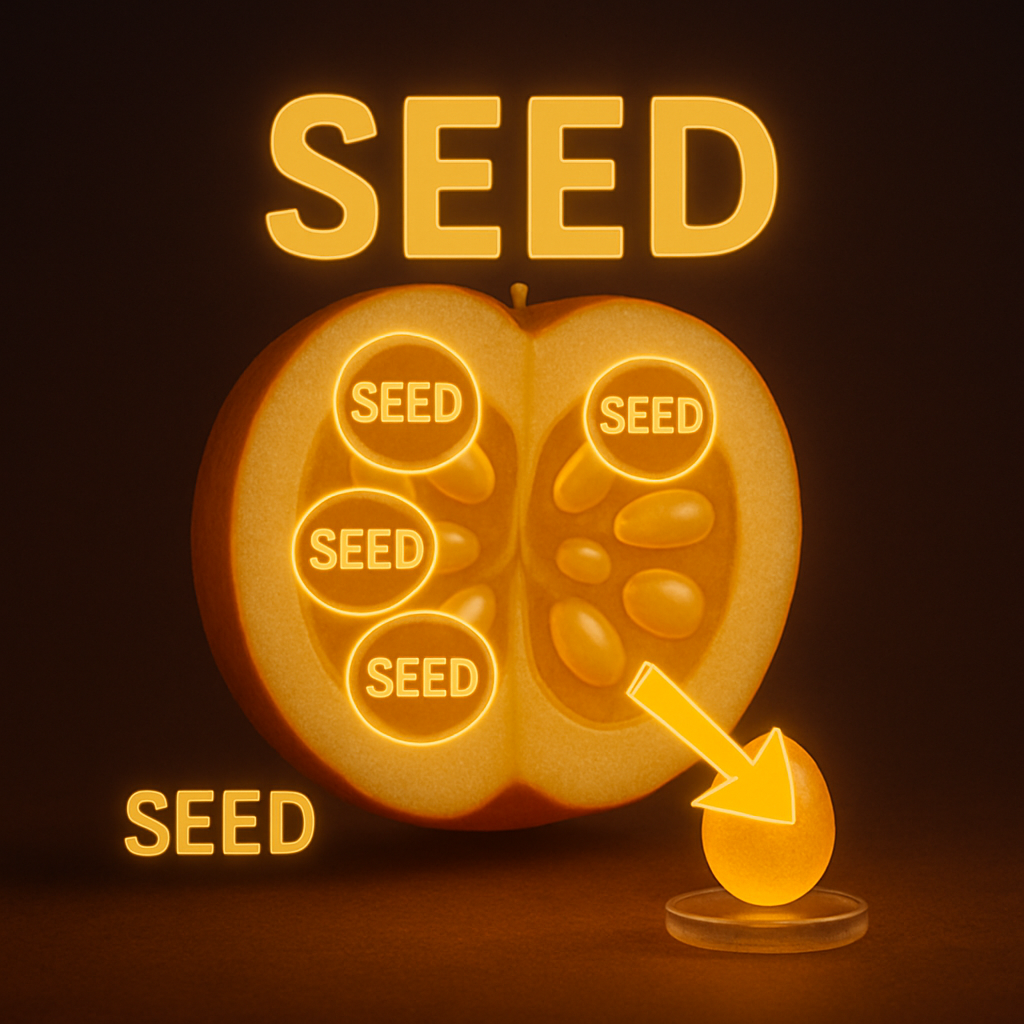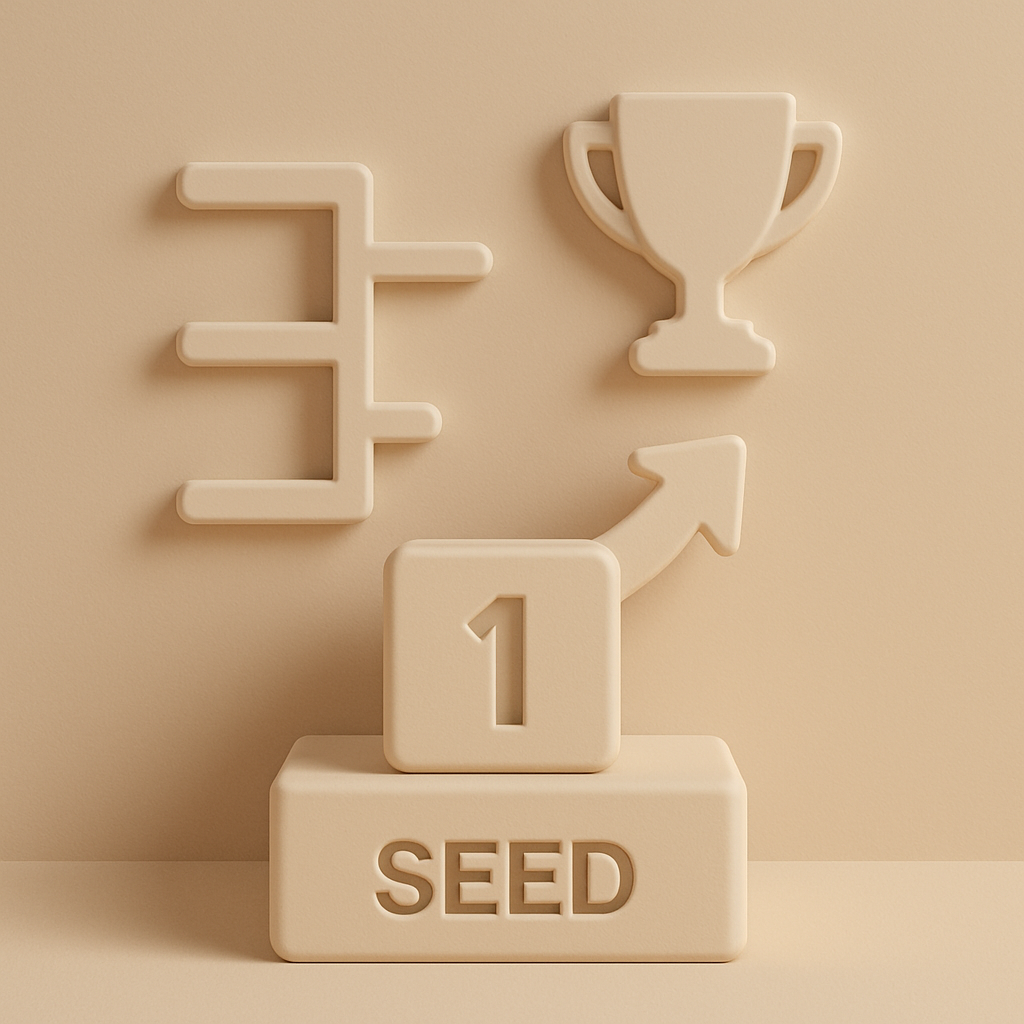Seed
Definition
The term "seed" refers to the reproductive structure of a plant that contains the embryo, capable of developing into a new plant. It can also metaphorically refer to the origin or starting point of something.
Parts of Speech
- Noun
- Verb
Pronunciation
American English
- IPA Pronunciation: /siːd/
- Respelling: SEED
British English
- IPA Pronunciation: /siːd/
- Respelling: SEED
Etymology
The word "seed" originates from the Old English "sǣd," meaning "something sown," derived from Proto-Germanic "sædi" and Proto-Indo-European "sē-," meaning "to sow." It has been used in English since before the 12th century to describe the reproductive structures of plants.
Derivatives
- Seeding (noun/verb)
- Seeder (noun)
- Seedless (adjective)
- Seedling (noun)
- Reseed (verb)
Synonyms
- Kernel
- Grain
- Sprout
Antonyms
- None
Usage
The term "seed" is commonly used in botany, agriculture, and metaphorical contexts. For example, "Farmers sowed seeds for the next harvest," or "The idea was the seed of a new movement."
Related Terms
- Sow: To plant seeds by scattering them on the soil.
- Sprout: The growth of a plant from a seed.
- Fertilize: To provide nutrients to soil or plants to aid growth.
Detailed Definitions
Noun
- The reproductive structure of a flowering plant containing an embryo:
- Example: "Each fruit contains multiple seeds."
- The origin or starting point of an idea or process:
- Example: "The seed of innovation was planted in their discussion."
- A participant in a tournament ranked based on ability:
- Example: "The team was the number one seed in the competition."
Verb
- To plant or scatter seeds:
- Example: "The farmer seeded the field with wheat."
- To remove seeds from a fruit or vegetable:
- Example: "She seeded the peppers before adding them to the dish."
- To rank participants in a tournament:
- Example: "Players were seeded based on their performance in prior matches."
seed



🇨🇳 Mandarin
- 种子 (zhǒngzǐ) - Seed, plant seed
- IPA: [ʈʂʊŋ˨˩˦ tsɹ̩˧˥]
- Respelling: zhong-zi
- 起源 (qǐyuán) - Seed, origin or source
- IPA: [t͡ɕʰi˥˩ yɛn˧˥]
- Respelling: chi-yuan
🇮🇳 Hindi
- बीज (bīj) - Seed, plant seed
- IPA: [biːd͡ʒ]
- Respelling: bee-j
- स्रोत (srot) - Seed, source or origin
- IPA: [sroːt̪]
- Respelling: sro-t
🇪🇸 Spanish
- Semilla - Seed, plant seed
- IPA: [seˈmiʝa]
- Respelling: se-mi-ya
- Origen - Seed, origin or source
- IPA: [oˈɾixen]
- Respelling: o-ri-xen
🇫🇷 French
- Graine - Seed, plant seed
- IPA: [ɡʁɛn]
- Respelling: gren
- Origine - Seed, origin or source
- IPA: [ɔʁiʒin]
- Respelling: o-ri-zhin
🇦🇪 Modern Standard Arabic
- بذرة (bizra) - Seed, plant seed
- IPA: [ˈbɪd͡ʒræ]
- Respelling: bi-zra
- مصدر (masdar) - Seed, source or origin
- IPA: [ˈmʌsdʌr]
- Respelling: mus-dar
🇧🇩 Bengali
- বীজ (bīj) - Seed, plant seed
- IPA: [biːd͡ʒ]
- Respelling: bee-j
- উত্স (utso) - Seed, source or origin
- IPA: [ut̪ʃ]
- Respelling: utsh
🇷🇺 Russian
- Семя (semya) - Seed, plant seed
- IPA: [ˈsʲemʲə]
- Respelling: sye-myuh
- Источник (istochnik) - Seed, source or origin
- IPA: [ɪˈstot͡ɕnʲɪk]
- Respelling: is-toch-nik
🇵🇹 Portuguese
- Semente - Seed, plant seed
- IPA: [sẽˈmẽt͡ʃi]
- Respelling: sen-men-chi
- Origem - Seed, origin or source
- IPA: [oɾiˈʒẽj̃]
- Respelling: o-ri-zhen
🇮🇩 Indonesian
- Biji - Seed, plant seed
- IPA: [bi.d͡ʒi]
- Respelling: bi-ji
- Sumber - Seed, source or origin
- IPA: [sʊm.bər]
- Respelling: sum-ber
🇩🇪 German
- Samen - Seed, plant seed
- IPA: [ˈzaːmən]
- Respelling: za-men
- Ursprung - Seed, origin or source
- IPA: [ˈʊʁʃpʁʊŋk]
- Respelling: ur-shprungk
🇯🇵 Japanese
- 種 (tane) - Seed, plant seed
- IPA: [ta̠ne̞]
- Respelling: ta-ne
- 由来 (yurai) - Seed, origin or source
- IPA: [jɯ̟ᵝɾa̠i]
- Respelling: yu-rai
🇻🇳 Vietnamese
- Hạt - Seed, plant seed
- IPA: [hat˧ˀ˨ʔ]
- Respelling: hat
- Nguồn - Seed, source or origin
- IPA: [ŋʷəːn˧ˀ˨ʔ]
- Respelling: nguon
🇰🇷 Korean
- 씨앗 (ssiat) - Seed, plant seed
- IPA: [ɕi.at̚]
- Respelling: sshi-at
- 원천 (woncheon) - Seed, source or origin
- IPA: [wʌn.tɕʰʌn]
- Respelling: won-chon
🇹🇷 Turkish
- Tohum - Seed, plant seed
- IPA: [tohum]
- Respelling: to-hum
- Kaynak - Seed, source or origin
- IPA: [kajnak]
- Respelling: kay-nak
🇵🇰 Urdu
- بیج (beej) - Seed, plant seed
- IPA: [biːd͡ʒ]
- Respelling: bee-j
- ذریعہ (zariya) - Seed, source or origin
- IPA: [zəˈriːə]
- Respelling: za-ri-ya





